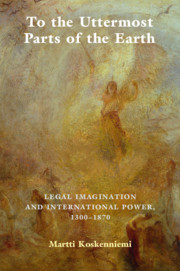Book contents
- To the Uttermost Parts of the Earth
- To the Uttermost Parts of the Earth
- Copyright page
- Dedication
- Contents
- Acknowledgements
- Introduction
- Part I Towards the Rule of Law
- Part II France: Law, Sovereignty and Revolution
- Part III Britain: Laws and Markets
- Part IV Germany: Law, Government, Freedom
- 11 A Science of State-Machines
- 12 The End of Natural Law
- Conclusion and Epilogue
- Bibliography
- Index
Conclusion and Epilogue
from Part IV - Germany: Law, Government, Freedom
Published online by Cambridge University Press: 05 August 2021
- To the Uttermost Parts of the Earth
- To the Uttermost Parts of the Earth
- Copyright page
- Dedication
- Contents
- Acknowledgements
- Introduction
- Part I Towards the Rule of Law
- Part II France: Law, Sovereignty and Revolution
- Part III Britain: Laws and Markets
- Part IV Germany: Law, Government, Freedom
- 11 A Science of State-Machines
- 12 The End of Natural Law
- Conclusion and Epilogue
- Bibliography
- Index
Summary
“… the organs are also prolongations of the tools”. According to one view, language works as an instrument for human intentions, including the imagining in which we engage in our lives. In this book I have taken the opposite to that perhaps commonsensical view, namely that the language we have determines for us the experience we have of the world, and in particular what alternatives for action we perceive therein. I have not adopted this view as a philosophical dictum. Like most such large dicta, I find it in the end too strong to be fully believable, even paradoxical. But in my life as an international lawyer, I have learned to rely on it as a very good rule of thumb when trying to understand the complexities of the governance of the international world. Why do well-educated professional women and men think and act the way they do? The technical or scientific language we have learned to master – law, development, human rights, security, environment, and so on – provides us both with an interpretation of the world as well as a recipe for dealing with its problems. Indeed, it outlines for us what those “problems” are in the first place. Having learned those languages, we attain positions of authority from which to tell people whom we address what they ought to believe or do. Professional languages have authority, and employing them we ourselves become authoritative, we become their prolongation. That is both an appealing and a problematic position in which to be. To exercise authority, we must adopt an authoritative language. But in immersing ourselves in that language, we lose critical distance from it.
- Type
- Chapter
- Information
- To the Uttermost Parts of the EarthLegal Imagination and International Power 1300–1870, pp. 952 - 967Publisher: Cambridge University PressPrint publication year: 2021

